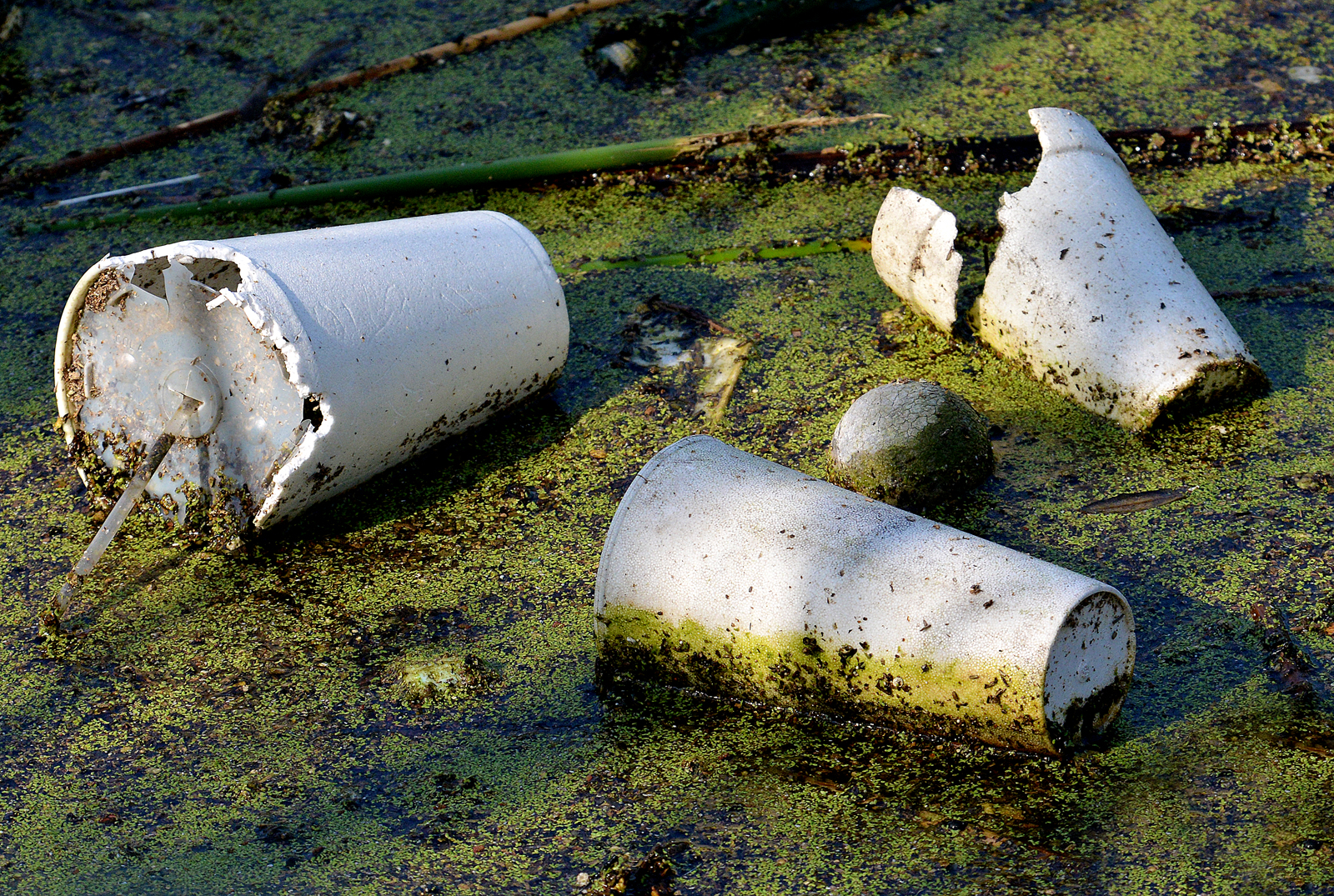Polystyrene plastic is made from petrochemicals. Polystyrene is commonly used in food packaging, where it comes in two forms, rigid and foam. The rigid form is used for clear food containers, plates, bowls, beverage cups and lids, utensils, and straws. The foam form (sometimes known by its trade name styrofoam) is used for plates, insulated beverage cups and bowls, clamshell food containers, and trays. You can recognize it by its resin code of 6. Foam is also used for shipping packaging such as "peanuts", but this is not usually marked with the code.
-
Health hazard - Polystyrene is based on styrene, a neurotoxin and probable carcinogen based on benzene. Styrene leaching increases with temperature and with certain foods (alcohol, oils or
 fat). Other risks include synthetic chemical additives such as colorants. The largest styrene and polystyrene factory in the world is located in Iberville Parish, part of what is called "Cancer Alley."
fat). Other risks include synthetic chemical additives such as colorants. The largest styrene and polystyrene factory in the world is located in Iberville Parish, part of what is called "Cancer Alley." -
Environmental hazard - The foam form in particular is often mistaken as food by both domesticated and wild animals. Birds may also use foam for nesting material. Untold numbers of animals die per year by ingesting polystyrene and other plastic items. It does not biodegrade, it just fractures into smaller and smaller bits called “microplastics.” These small particles present the greatest long-term danger, as these particles displace food supplies in the world’s oceans. Once microplastics enter our oceans, they will stay there virtually forever, because they persist and their removal is not possible.
-
Not recycled - The bulky foam form is not accepted in curbside recycling programs in Massachusetts (and most other states). Because foam is 95% air and often contaminated with food residue, recycling is impractical. The rigid form even when collected curbside is seldom recycled.
Why is such a toxic material in use? Polystyrene is cheaper than some alternatives. However, the environmental expense of polystyrene far exceeds the cost restaurants and grocery stores are currently paying to provide them. Alternatives to polystyrene are biodegradable paper or woodenware, compostable bioplastics; or highly recyclable aluminum. Note that compostable items should be certified by third-party organizations such as BPI to ensure that they degrade and do not contain PFAS. Of course restaurants and cafeterias can always offer traditional reusable items that are washable.
Waste Bans
Bans on polystyrene food items are in place all over the world: in major cities such as Oakland, San Francisco, and Chicago; in the neighboring states of Maine, New York, and Vermont; and countries such as China, India, and Taiwan.
Some local communities have also banned the retail sale of polystyrene products such as Arlington, Brookline, Concord, Fairhaven, Manchester-by-the-Sea, Newton, Williamstown and Wellfleet; while nationally, several states have banned the sale of polystyrene foam. Many states have also banned the retail sales of polystyrene foam products (including coolers and packing peanuts) and foam product packaging such as egg cartons.
If you want to eliminate single-use straws and utensils, simply require that all food service ware be reusable, recyclable or compostable (as has been done in Andover, Brookline, Concord, Manchester-by-the-Sea, Newton, Northampton, Revere, Swampscott, and Williamstown). Typical polystyrene and polypropylene plastic straws do not meet these criteria. Sample regulation is below under the Resources section.
Some laws also require that food serviceware accessories such as utensils and individual condiment packages will be available only upon request (for example, Newton).
How Can I Help?
-
Avoid polystyrene and other toxic plastics such as PETE where possible. Choose sustainable alternatives (such as paper plates), don't use straws where possible, and bring your own reusables (such as a water bottle or coffee/tea thermos). Tell your food establishments that you'd like them to offer reusable or compostable utensils and serving ware. When ordering by mail, tell shippers that you prefer not to use polystyrene foam packing peanuts.
-
Support state-wide efforts. Visit our 2023-2024 Priorities page to learn more.
How do I get a polystyrene ban passed in my community?
You have two methods:
1) Local by-law or ordinance - most common and more permanent.
2) Board of Health (as in Lenox, South Hadley and Westfield) - can be quicker and easier.
If you decide on legislation:
1)Find family, friends and/or neighbors in your community and form a group of polystyrene ban supporters.
2) Contact your local elected officials. You may already have a sympathetic legislator. Use this fact sheet for guidance.
3) Conduct outreach and education. Have a public film showing of a movie on plastic waste like Bag It. Write a letter to the editor of your local newspaper.
4) Develop support with local environmental groups or related municipal boards, committees or commissions (such as Conservation, Health, Parks, Recycling).
5) Definitely let us know, as we want to help you! Together we can put Massachusetts on the path to a statewide ban of these insidious and destructive forms of pollution.
Resources:
Sustainable Packaging model law - this is the city version, which can be adapted for Towns. This full version includes the options of banning PETE and PVC; banning both rigid and foam polystyrene products; and requiring that all food service ware be reusable, compostable, or municipally recyclable.
Compare Polystyrene Laws in Massachusetts (through 2017)